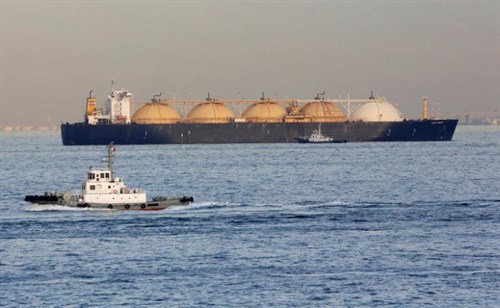As China faces winter gas crunch, LNG prices soar
SINGAPORE/BEIJING (Reuters) — China is hoovering up LNG cargoes worldwide, pushing spot prices for the fuel above those for oil-indexed cargoes, as energy providers scramble to avoid a looming winter supply crunch.
 |
China has moved millions of households from burning dirty coal to natural gas this year, pushing up import demand amid an already tightening overall Asian market.
Most Asian LNG supplies are delivered under long-term contracts with prices linked to crude oil.
But with the upcoming winter heating season, Chinese utilities have turned to the spot market in desperation to cover themselves in order to meet surging demand, chartering tankers from as far away as Norway.
"We expect (China's national oil and gas majors) CNOOC, PetroChina, and Sinopec to buy 30% more (LNG) on the spot market in the coming three months compared with last year, to help boost supplies," said Jiang Jin, gas analyst at JLC Energy.
"LNG terminals are running at full capacity," she added.
A similar short-term supply crunch late last year boosted spot Asian LNG prices by more than 80 in the last four months of the year, and pushed China's December 2016 imports to a record 3.7 MMt, nearly double the 2016 average of just 2 MMt a month.
With millions more households having moved to gas since then, last year's record is expected to be smashed this year.
"The Chinese are in panic mode. They clearly underestimated the push in demand from their gasification program. Now they are soaking up LNG spot cargoes where they can. And suppliers are happy to deliver, at a premium," said a trader with a major commodity merchant.
Asian spot LNG prices have soared by more than two-thirds since May to $9/MMBtu, above oil-linked prices of around $8/MMBtu.
"I'm fairly certain China will break a new import record very soon and that spot prices will break through $10," the trader said, declining to be named as he is not allowed to talk about publicly pricing.
Unlike coal or oil, where China is the world's biggest importer, the country is only the number three buyer of LNG behind South Korea and Japan.
But its gasification program is set to change that.
"Beijing reiterated its commitment to growing the share of natural gas in the domestic energy mix in the recently held 9th National Party Congress as part of a broader move to tackle air pollution," BMI Research said on Friday.
The scale of China's soaring gas demand can be seen in the major industrial province of Hebei.
"Hebei province alone needs an extra 2 Bcm of natural gas for heating because of mandatory measures to switch industrial and residential boilers to use natural gas," JLC's Jiang said, referring to winter demand.
That's the equivalent of 870,000 t of extra LNG, equal to almost a quarter of the country's total demand.
Reporting by Henning Gloystein in SINGAPORE and Meng Meng in BEIJING; Editing by Richard Pullin

- RWE strengthens partnerships with ADNOC and Masdar to enhance energy security in Germany and Europe
- TotalEnergies and Mozambique announce the full restart of the $20-B Mozambique LNG project
- Venture Global wins LNG arbitration case brought by Spain's Repsol
- KBR awarded FEED for Coastal Bend LNG project
- Norway pipeline gas export down 2.3% in 2025, seen steady this year



Comments